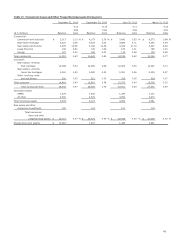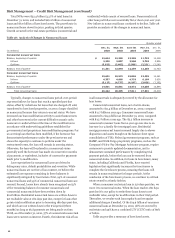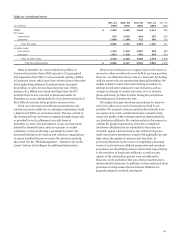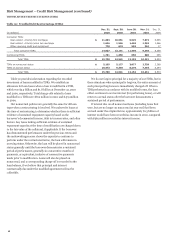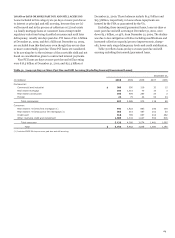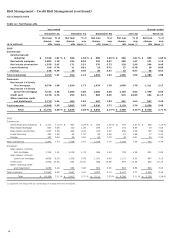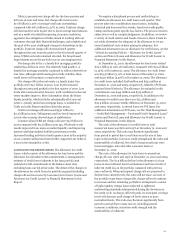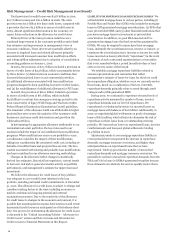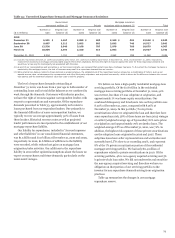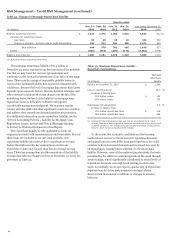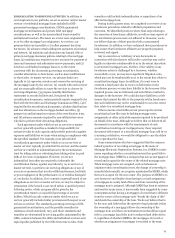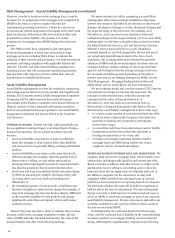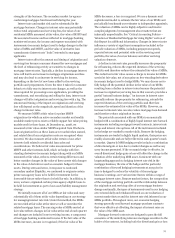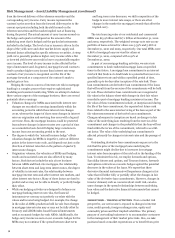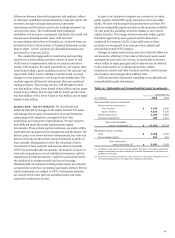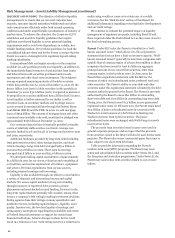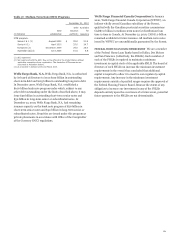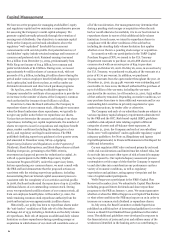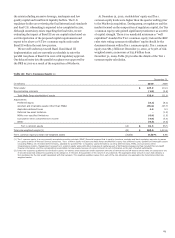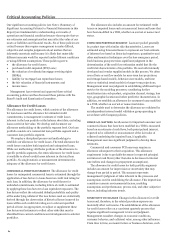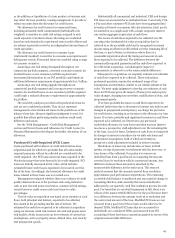Wells Fargo 2010 Annual Report Download - page 77
Download and view the complete annual report
Please find page 77 of the 2010 Wells Fargo annual report below. You can navigate through the pages in the report by either clicking on the pages listed below, or by using the keyword search tool below to find specific information within the annual report.RISKS RELATING TO SERVICING ACTIVITIES In addition to
servicing loans in our portfolio, we act as servicer and/or master
servicer of residential mortgage loans included in GSE-
guaranteed mortgage securitizations, GNMA-guaranteed
mortgage securitizations and private label mortgage
securitizations, as well as for unsecuritized loans owned by
institutional investors. The loans we service were originated by
us or by other mortgage loan originators. As servicer, our
primary duties are typically to (1) collect payment due from
borrowers, (2) advance certain delinquent payments of principal
and interest, (3) maintain and administer any hazard, title or
primary mortgage insurance policies relating to the mortgage
loans, (4) maintain any required escrow accounts for payment of
taxes and insurance and administer escrow payments, and (5)
foreclose on defaulted mortgage loans or, to the extent
consistent with the documents governing a securitization,
consider alternatives to foreclosure, such as loan modifications
or short sales. As master servicer, our primary duties are
typically to (1) supervise, monitor and oversee the servicing of
the mortgage loans by the servicer, (2) consult with each servicer
and use reasonable efforts to cause the servicer to observe its
servicing obligations, (3) prepare monthly distribution
statements to security holders and, if required by the
securitization documents, certain periodic reports required to be
filed with the Securities and Exchange Commission (SEC), (4) if
required by the securitization documents, calculate distributions
and loss allocations on the mortgage-backed securities, (5)
prepare tax and information returns of the securitization trust,
and (6) advance amounts required by non-affiliated servicers
who fail to perform their advancing obligations.
Each agreement under which we act as servicer or master
servicer generally specifies a standard of responsibility for
actions we take in such capacity and provides protection against
expenses and liabilities we incur when acting in compliance with
the specified standard. For example, most private label
securitization agreements under which we act as servicer or
master servicer typically provide that the servicer and the master
servicer are entitled to indemnification by the securitization
trust for taking action or refraining from taking action in good
faith or for errors in judgment. However, we are not
indemnified, but rather are required to indemnify the
securitization trustee, against any failure by us, as servicer or
master servicer, to perform our servicing obligations or any of
our acts or omissions that involve willful misfeasance, bad faith
or gross negligence in the performance of, or reckless disregard
of, our duties. In addition, if we commit a material breach of our
obligations as servicer or master servicer, we may be subject to
termination if the breach is not cured within a specified period
following notice, which can generally be given by the
securitization trustee or a specified percentage of security
holders. Whole loan sale contracts under which we act as
servicer generally include similar provisions with respect to our
actions as servicer. The standards governing servicing in GSE-
guaranteed securitizations, and the possible remedies for
violations of such standards, vary, and those standards and
remedies are determined by servicing guides maintained by the
GSEs, contracts between the GSEs and individual servicers and
topical guides published by the GSEs from time to time. Such
remedies could include indemnification or repurchase of an
affected mortgage loan.
During fourth quarter 2010, we completed our review of our
foreclosure procedures related to affidavit preparation and
execution. We identified practices where final steps relating to
the execution of foreclosure affidavits, as well as some aspects of
the notarization process were not adhered to. However, we do
not believe that any of these practices led to unwarranted
foreclosures. In addition, we have enhanced those procedures to
help ensure that foreclosure affidavits are properly prepared,
reviewed, and signed.
Any re-execution or redelivery of any documents in
connection with foreclosures will involve costs that may not be
legally or otherwise reimbursable to us to the extent they relate
to securitized mortgage loans. Further, if the validity of any
foreclosure action is challenged by a borrower, whether
successfully or not, we may incur significant litigation costs,
which may not be reimbursable to us to the extent they relate to
securitized mortgage loans. In addition, if a court were to
overturn a foreclosure due to errors or deficiencies in the
foreclosure process, we may have liability to the borrower if the
required process was not followed and such failure resulted in
damages to the borrower. We could also have liability to a title
insurer that insured the title to the property sold in foreclosure.
Any such liabilities may not be reimbursable to us to the extent
they relate to a securitized mortgage loan.
Other concerns cited within recent press reports are that
securitization loan files may be lacking mortgage notes,
assignments or other critical documents required to be produced
on behalf of the trust. Although we believe that we delivered all
documents in accordance with the requirements of each
securitization involving our mortgage loans, if any required
document with respect to a securitized mortgage loan sold by us
is missing or defective, we would be obligated to cure the defect
or to repurchase the loan.
Some commentators also have suggested that the common
industry practice of recording a mortgage in the name of
Mortgage Electronic Registration Systems, Inc. (MERS) creates
issues regarding whether a securitization trust has good title to
the mortgage loan. MERS is a company that acts as mortgagee of
record and as agent for the owner of the related mortgage note.
When mortgage notes are assigned, such as between an
originator and a securitization trust, the change of ownership is
recorded electronically on a register maintained by MERS, which
then acts as agent for the new owner. The purpose of MERS is to
save borrowers and lenders from having to record assignments
of mortgages in county land offices each time ownership of the
mortgage note is assigned. Although MERS has been in existence
and used for many years, it has recently been suggested by some
commentators that having a mortgagee of record that is different
from the owner of the mortgage note “breaks the chain of title”
and clouds the ownership of the loan. We do not believe that to
be the case, and believe that the operative legal principle is that
the ownership of a mortgage follows the ownership of the
mortgage note, and that a securitization trust should have good
title to a mortgage loan if the note is endorsed and delivered to
it, regardless of whether MERS is the mortgagee of record or
whether an assignment of mortgage is recorded to the trust.
75


